Download this paper as a PDF:
Supporting Equity for Māori and Pacific students in New Zealand Scholarship [PDF, 1.1 MB]
New Zealand Scholarship challenges the most able secondary school students over and above NCEA Level 3. The award of a Scholarship provides recognition and monetary reward to students who can apply high-level critical thinking, knowledge, skills, understanding, and ideas to complex situations.
New Zealand Scholarship (external link)
Introduction
All schools have the potential to support equity of Māori and Pacific participation in Scholarship. Equity would mean Māori and Pacific students participating in Scholarship at the same rate as students of Non-Māori or Pacific ethnicities.
Students successful in Scholarship have a combination of motivation, ability and opportunity. The research in this paper suggests that addressing a lack of opportunity to attempt Scholarship will play a significant role in supporting Māori and Pacific students to achieve Scholarship awards.
Supporting Māori and Pacific students to enter and work towards multiple Scholarship subjects would also create the opportunity for receiving a wider range of awards, including Outstanding Scholar Awards, Premier Awards and the Prime Minister’s Award for Academic Excellence.
For a student to receive a Scholarship award, they must first be identified and entered by their school. Māori and Pacific students are significantly under-represented in both entries for Scholarship assessments and awards gained.
Table 1: Scholarship entrance by ethnicity 2019-2021
| Māori | Pacific | Non-Māori or Pacific | |
| Overall secondary student cohort | 17% | 9% | |
| 2019 | 8.4% | 4.6% | 87.6% |
| 2020 | 8.1% | 4.3% | 88.2% |
| 2021 | 8.5% | 4.6% | 87.5% |
(Numbers in this table may not add to 100% due to rounding and students’ selection of multiple (or no) ethnicity. Each student may be entered in one or more Scholarship subjects.)
Table 2: Scholarship awards received by ethnicity 2019-2021
| Māori | Pacific | Non-Māori or Pacific | |
| Single Subject Awards | 401 | 138 | 6,078 |
| Scholarship Awards | 20 | 5 | 675 |
| Top Subject Scholar Awards | 10 | 9 | 89 |
| Outstanding Scholar Awards | 6 | 0 | 164 |
| Premier Awards | 0 | 0 | 36 |
| Prime Minister's Award | 0 | 0 | 4 |
In 2021, NZQA began a three-year research project to investigate how schools/kura, government agencies and others can improve equity of outcomes for Māori and Pacific students in Scholarship. This preliminary study reflects on the first two phases of the project (conducted in 2021 and 2022, respectively). The first phase of this research was focused on students where individual Māori and Pacific students experienced significant success in Scholarship, while the second shines a light on trends observed in 13 secondary schools with strong student participation in Scholarship, and whose Māori and Pacific student population is nationally representative.
On this page
Sample size
This paper primarily draws on two phases of research conducted by NZQA in 2021 and 2022.
The first phase of the project involved students in 10 schools that had proportionally high levels of entries and success for Māori and Pacific students in Scholarship. Located in both the North and South Islands and in a mix of rural and urban settings, eight of the schools in the sample were co-educational.
The second phase of research, conducted in 2022, included 13 schools whose student populations are nationally representative by being at least 17% Māori or 9% Pacific. These schools have a high equity ratio¹ for Māori and Pacific learner attainment at NCEA Level 3 and have at least 25 students a year participate in New Zealand Scholarship. The schools, located in eight cities across the North Island, are comprised of six single sex girls’ schools, six single sex boys’ schools and one co-educational school. Three of the schools are faith-based.
We received 215 student responses in the second phase of this study, with 20 students identifying that they whakapapa Māori, 16 identifying a Pacific ethnicity, 117 identifying as European, 37 identifying as Asian, and 25 identifying as another ethnicity. Three quarters of the students indicated they were attempting Scholarship in 2022, and the rest indicating they were possible candidates in 2023.
Unless noted otherwise, the findings in this paper relate to the 2022 phase of research.
Benefits of participating in Scholarship
The first phase of this research investigated the benefits to students of participating in Scholarship, even if they were unsuccessful in receiving an award.
In addition to the recognition and financial reward of Scholarship, interviewed students were found to develop skills and dispositions that support their NCEA and future studies, such as in the areas of:
- motivation, organisation and perseverance;
- critical thinking, synthesising information and problem solving;
- enthusiasm for learning and pursuing their academic interests; and
- in-depth knowledge of disciplinary skills, content, and potential pathways.
Regardless of their success in Scholarship, students also achieve better results in NCEA. This suggests the support provided and behaviour encouraged in working towards Scholarship enhanced the development of students’ critical thinking and analytical skills and had a broad positive impact on study skills, motivation, and goal setting.
Equity in Scholarship as a school priority
Five of the schools involved in the research have equity as a strategic driver, but only one is actively developing plans and actions to build Pacific student participation in Scholarship. The other schools did not report explicit plans to improve equity in Scholarship participation or achievement, with several reporting a need to address motivation for school in general before considering Scholarship.
Whether schools identify Scholarship as a strategic priority depends on what the school is wanting to achieve. Most schools describe Scholarship participation as important to meet individual student academic needs, and/or because their staff are highly engaged and experienced, and are confident in promoting student interests through Scholarship. Some schools also note the marketing opportunity to prospective students that high Scholarship achievement rates provide.
Half of the schools in the project have achievement outcomes other than Scholarship as their priority. Broader strategic actions in some schools include a Scholarship focus.
Student knowledge and understanding of Scholarship
Feedback from Māori and Pacific students indicates a generally low level of knowledge and understanding about the existence of Scholarship, the requirements to be awarded a Scholarship, how to enter, or the kinds of support schools could make available to Scholarship candidates.
This lack of awareness means Māori and Pacific students who are not identified as potential Scholarship candidates by schools may be less likely to approach teachers about entering, and makes it difficult for whānau or other community leaders to suggest Scholarship entry to students.
How do schools identify and support Scholarship students?
What are secondary schools doing to encourage participation by ākonga Māori and Pacific learners?
Schools described a range of actions they take to identify potential Scholarship students.
All sampled schools report supporting any student wanting to participate in Scholarship examinations. The aspirations of students or their whānau could be a valuable input into considering whether students might be potential Scholarship entrants.
Some schools ‘shoulder tap’ students who they believe are capable. None of the schools sampled currently track their Scholarship entrants to ensure they reflect a range of ethnic groups.
About half the schools support Year 12 students to enter Scholarship examinations, usually to give them practice as part of an acceleration programme.
Four schools, (3 single sex boys’ and one single sex girls’) draw their Scholarship students from special gifted and talented programmes for Year 10 or 11 students. The ethnic makeup of these programmes will be considered further in the next phase of the research to find out if it presents a limiting factor on equity for Scholarship entries.
Those offering dedicated Scholarship programmes often start in Year 10, using student performance in Year 9 as the measurement. While they allow Year 12 and 13 students outside these programmes to enter, how schools manage students on this second pathway is not clear. Nor is whether the schools analysed the participation and success of Scholarship students against the pathway they took.
The first phase of this research asked schools with successful Māori and Pacific Scholarship candidates how they engage students in Scholarship. Their feedback indicated that a multi-pronged strategy for engaging students in Scholarship is the most effective, including whole group (written, repeated) and individual approaches. This should include:
- general information in a senior school assembly, including messages from current and former Scholarship students
- written information available on the school website / portal / Google classroom
- invitations to attend information sessions for subject and learning areas, in whānau time or during class (not in break times)
- approaches to individual students that reinforce that the teacher sees real potential in the student, and that the teacher and student will be working together towards success
- positive impact on success at NCEA Level 3.
Support and wellbeing for Scholarship candidates
The first phase of this research identified the learning or study support available to Scholarship students, findings include:
- holding tutorials before school, at lunchtime, in the holidays
- having scheduled sessions, and compensating teachers with time if possible
- in multi-level classes having the teacher differentiate to cater for Scholarship students’ learning and assessment needs
- providing access to resources through Google classroom, workshops at other schools, and bringing in retired subject experts.
From the student sample in the second phase, no Pacific respondents relied on self-management, but identified school-based teacher support and out of school support as their primary forms of support/assistance. The most common form of support all students experienced was from their teachers.
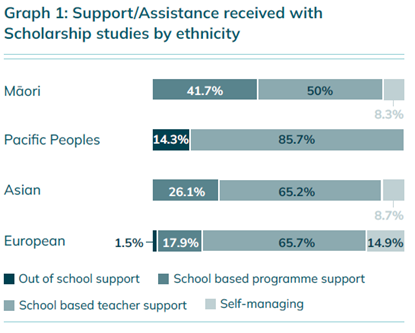
Some schools timetable Scholarship classes as part of a student’s programme but teaching and learning in most schools occurs in the teachers and students’ free time. One school provides a purpose-built space exclusively for their most able Scholarship students.
Most schools have a senior or middle manager responsible for supporting Scholarship students and one school provides a management unit for this. Other schools allocate time and or management units as part of a broader role with programmes for accelerated or gifted and talented students.
The research has not yet investigated the uptake of different forms of support by ethnicity, or their impact on student achievement.
Supporting students' wellbeing
Six of the schools include the monitoring of health and well-being as part of supporting Scholarship candidates. In some cases, this monitoring is focused on students who are participating in multiple subjects.
The first phase of this research also reflected on the need for schools to consider the holistic impact of Scholarship on students, including:
- personal wellbeing – workload, stress and other commitments
- prioritising one Scholarship subject over others, or prioritising NCEA achievement
- whether engaging in Scholarship is the best option when students may also wish to apply for tertiary scholarships and grants, and to be eligible for community and school awards
- how these impacts will be monitored during the year for individuals and groups.
What motivates participation?
The first phase of research showed that four interacting components guide behaviours – opportunity, motivation, capability, and capacity. Building on this initial work, NZQA has sought feedback from students both on their primary motivation for entering Scholarship, and the other supporting influences on their decision.
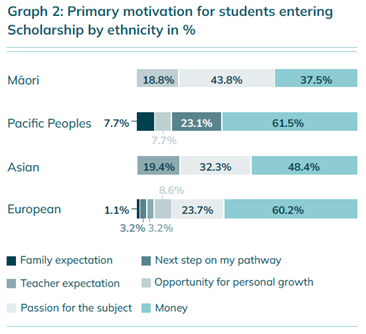
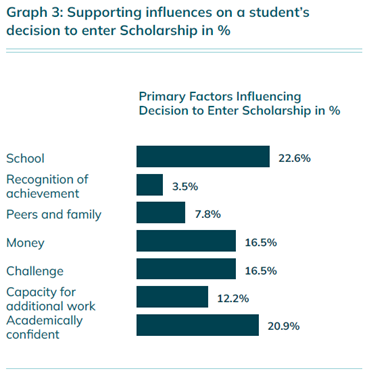
Monetary award
Monetary reward was the primary motivator for European, Pacific and Asian students entering Scholarship. For Māori students, ‘Passion for the subject’ was the primary motivator for 43.8% of respondents, and ‘Money’ (37.5%) came second. Even where it was not the primary motivation, the financial award plays a significant role in influencing students to enter Scholarship.
This result may be somewhat surprising, given that a single subject award provides a one-off payment of $500 – an amount easily achievable through summer or weekend work. To receive more than $1000, a student typically needs to receive Scholarships in at least 3 subjects². It was unclear whether students had an accurate impression of the monetary rewards that are available.
Staff in the six boys’ schools all report money as a primary motivator; also noting that some students say the financial reward is not enough as they can earn the sum with a part time job. Single sex girls’ schools did not mention money.
Passion for the subject and opportunity for personal growth
The love of a subject was the largest primary motivation for Māori students and second greatest primary motivator for Pacific, European and Asian students. For every ethnicity, the opportunity for personal growth was the third most common primary motivation. In the girls’ schools, in particular, leaders describe the subject and the opportunity to develop a relationship of trust with teachers based around critical and creative thinking as highly motivating.
Two integrated schools ascribed their faith-based educational approach as a significant motivating factor.
Academic confidence and school support
While not a common primary motivation, students’ confidence – and the support of the school – were the most influential factors in supporting a decision to enter Scholarship. This reinforces the important role schools have in encouraging students to push their boundaries and reflects the importance students attach to their schools identifying their Scholarship potential. However, it conversely suggests that capable students who do not receive this encouragement may decide not to attempt Scholarship.
Challenge, prestige and the recognition of achievement
The challenge posed by Scholarship was a significant factor influencing students’ decisions to enter, likely tied to the opportunity for personal growth. Schools describe the prestige given to students who gain a Scholarship as a student motivator – however, the recognition of achievement was the least important motivating factor for students
Understanding student confidence, capacity and subject choices
Student confidence
Except for Pacific students who equally rely on teacher feedback, students mainly use their current academic achievement to identity that they are at Scholarship level.
The threshold to be awarded a Scholarship is high. While Scholarship is available to any student enrolled in a New Zealand secondary school, the number awarded in each subject is based on approximately 3 percent of all students who achieve 14 or more credits in the subject at NCEA Level 3.
Several schools describe this threshold as a demotivating factor for students and teachers. Ethnicity is linked to how confident students are in their ability to achieve, with Pacific students more confident than any other ethnic group on average, and Māori students the least confident on average.
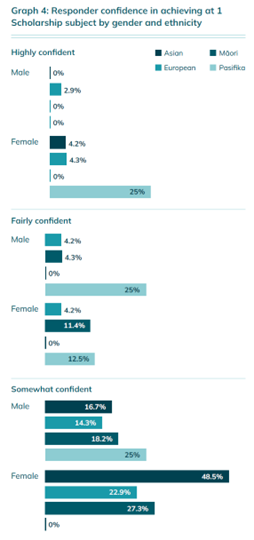
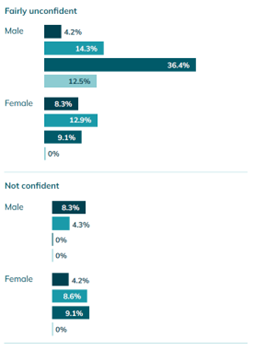
Both Māori and Pacific students said that finding out more about Scholarship and the support available to Scholarship candidates would increase their confidence.
Student capacity
Are ākonga Māori and Pacific learners entering enough Scholarship subjects to receive the top awards?
The number of Scholarship subjects a student enters and is assessed on is linked to ethnicity. On average, Asian and European students enter and are assessed in more subjects than their Māori and Pacific classmates.
With Outstanding Scholar Awards, Premier Awards and the Prime Minister’s Award for Academic Excellence all requiring students to achieve Scholarship or Outstanding Scholarship results in multiple subjects, the relatively fewer subjects attempted by Māori and Pacific students suggests a barrier to receiving these awards.
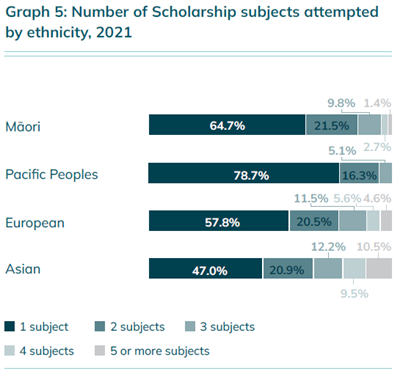
Scholarship subject choices
A third of Pacific and Māori students’ Scholarship subject entries are in either Samoan or Te Reo Māori, while for European and Asian students the same proportion enter for English.
With the number of Scholarships available limited to approximately 3% of the number of students who attain 14 or more credits in that subject at NCEA Level 3, the number of awards available in smaller subjects such as Samoan and Te Reo Māori potentially poses a limiting factor on Māori and Pacific attainment.
Schools report that NCEA subject choices also impact on a student’s capacity to participate in Scholarship. For example, they perceive student workload is reduced where the skills and learning for a Level 3 NCEA subject correlates with Scholarship requirements (e.g., Visual Arts).
With the important role schools play in students’ subject selection, there is an opportunity for schools to directly support students to enter Scholarship subjects in a way which maximises their opportunity to receive a top award.
How schools can encourage equity in participation
The first phase of this research asked students in schools with high levels of Scholarship success for Māori and Pacific students how their schools could encourage equity in participation.
Feedback from Māori students showed they are more likely to engage with Scholarship if:
- they have a personal relationship with their Scholarship teacher or tutor
- the invitation to participate is individual, repeated, and is an invitation to a reciprocal learning relationship and not to an assessment
- they can see examples of other Māori students being successful in Scholarship
- they have an opportunity to use their own interests, cultural capital, ideas and goals to influence the Scholarship assessment (particularly accessible in the submitted Scholarship subjects, and in selecting contexts for some examined Scholarship subjects).
In addition to these factors, Pacific students told NZQA they are more likely to engage with Scholarship if:
- they can learn with their friends, and invite other Pacific students to join
- they know that their teachers ‘see’ them as both strong individual learners, and as strong Pacific learners
- they have been repeatedly encouraged to acknowledge their academic potential.
Identifying potential Scholarship candidates
Is the identification process followed by schools a barrier to ākonga Māori and Pacific learners?
Our analysis of achievement shows that an early indication of student achievement can be found amongst those with at least 14 Excellence credits at Level 2 in that subject.
Identifying potential Scholarship candidates at Level 2 and supporting them as they prepare for Scholarship and NCEA Level 3 in Year 13, therefore appears to provide an opportunity for schools to enhance Scholarship achievement.

Building teacher capabilities and capacity
The ability and confidence of teachers to support students is a key factor in determining student subject choices and entries in Scholarship examinations.
While some schools have a strong pool of Scholarship subject specialists to draw on, in most cases the expertise in schools is limited to certain subjects. Having access to subject specialists and expertise would help them to expand student participation.
The capacity of teachers to provide additional support to Scholarship candidates was also raised as a challenge. Compounding this, there is limited ability for schools to recognise the additional work for teachers (particularly those who offer support outside of school time), meaning teachers receive no additional incentive, or only a token recognition, for this work.
Schools aiming to improve their Scholarship results could target recruitment and retention of key staff through (financial or non-financial) recognition of their work, and celebrating the achievement of their students. Additionally, it might be possible for Scholarship subject experts to work across schools to support a larger number of students, or to support the confidence of teachers by providing access to Scholarship resources and networks.
Conclusions
All schools sampled have the potential to support equity of Māori and Pacific participation in New Zealand Scholarship examinations, but none have yet accomplished this.
The first signpost that schools could use to enhance equity is to ensure Māori and Pacific students with potential to succeed are identified and entered for Scholarship. Identification through pre-selected programmes (such as gifted and talented programmes) should consider whether the membership of these groups lends itself to equity for Māori and Pacific students, and if not, how they will identify capable Māori and Pacific students from outside these groups.
There may be a disconnect between the reasons schools think students enter Scholarship, and the reasons given by students. Schools may need to consider the wider range of motivations when identifying potential candidates; and could make information about Scholarship more widely available to students, whānau and community leaders to help identify capable students.
Supporting Māori and Pacific students to enter and work towards multiple Scholarship subjects also creates the potential for them to receive a wider range of awards, including the more prestigious Outstanding Scholar Awards, Premier Awards and Prime Minister’s Award.
With schools having limited ability to support Scholarship candidates, prioritising those methods that are accessible and successful for Māori and Pacific students would support equity for these candidates
Recommendations
To help provide more equitable outcomes in New Zealand Scholarship, we recommend schools and NZQA pay attention to the following key areas:
Schools:
- Should reflect on the degree to which their candidates for Scholarship reflect the Māori and Pacific population of their school.
- Should be mindful of equity when identifying students for entry to Scholarship, and provide information about Scholarship that allows for the identification of capable students they may not have shoulder tapped.
- Should consider whether the number and range of subjects that capable Māori and Pacific students enter in Scholarship position them to receive the top awards.
- Could actively ask the aspirations of Māori and Pacific students and their whānau before identifying potential entrants for Scholarship.
- Could consider promoting Scholarship entry to those students with at least 14 Excellence credits at Level 2 in a Scholarship subject.
- Could consider if there is a role for community or other experts who are not subject teachers to work with students e.g. in the Samoan language.
- Could prioritise support that is accessible for Māori and Pacific students when developing support programmes for Scholarship candidates.
- Might consider how to work together to share Scholarship experts and support programmes across schools.
NZQA:
- Should work with schools and students to provide advice on what methods of support are accessible to Māori and Pacific Scholarship candidates, and are most likely to enhance their success.
- Should develop communications to students, whānau and communities about Scholarship that support the identification of capable students and motivate students to participate in Scholarship.
- Should consider ways to support schools wanting to build teacher capability to deliver Scholarship, such as sharing examples of best practice from schools that have developed subject teachers’ skill and knowledge in Scholarship.
Useful reading
TKI Inclusive Education. (n.d.). Supporting ākonga Māori.
Supporting ākonga Māori (external link) — inclusive.tki.org.nz
Teaching Council New Zealand. (n.d.). Tātaiako: Cultural competencies for teachers of Māori learners
Tātaiako: Cultural competencies for teachers of Māori learners (external link) — teachingcouncil.nz
TKI Pasifika Education. (n.d.).
Tapasa: Cultural competencies framework for teachers of Pacific learners (external link) — pasifika.tki.org.nz
Meissel, K., & Rubie-Davies, C. M. (2016). Cultural invariance of goal orientation and self-efficacy in New Zealand: Relations with achievement. British Journal of Educational Psychology, 86(1), 92-111. doi: 10.1111/bjep.12093
(The third hypothesis in this paper is about teacher attitude towards Maori and Pasifika students influencing self-efficacy in those students.)
NZQA’s Insights papers on NCEA Pathways through senior secondary school and whether current programmes lead to equity for Māori and Pacific students achieving University Entrance are also likely to be of interest to readers of this paper.
Acknowledgement
NZQA would like to thank the schools and students who participated in this research during 2021 and 2022, whose insights and experiences form the basis for this paper. We also thank those schools and students who are participating in 2023.
Footnotes
¹ NZQA’s Equity Ratio compares achievement of ākonga Māori (Māori students) to non-Māori students. An equity ratio of 1:1 reflects equal outcomes for Māori and non-Māori students.
² The exceptions are Top Subject Scholarships – for students who receive the highest score in a subject – and Scholarship Awards where students have two Outstanding Scholarship results. Each of the students who receive these awards are eligible for $2,000 each year for three years, so long as they maintain at least a "B" grade average in tertiary studies.

